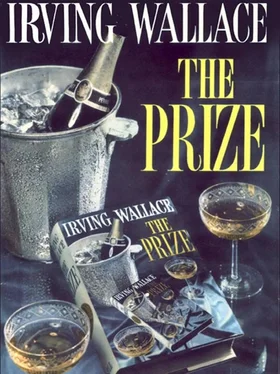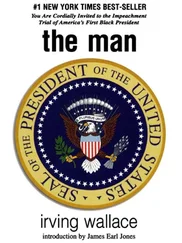Cognizant of her acute embarrassment, and sorry he had caused it-having wished only to crown her quiet beauty-Count Jacobsson quickly resumed his recital. ‘Nobel was a Socialist, but on the other hand, he believed in an elected dictator and in suffrage limited to the educated minority. As to prizes, Nobel ridiculed them. He liked to say that he owed his award of the Swedish Order of the North Star to his cook, because his cook’s dishes had seduced those who gave the medal. He insisted that he received the Brazilian Order of the Rose only because he knew Dom Pedro, ruler of Brazil. He detested publicity, and would not give interviews or allow himself to be photographed. “That is for actors and murderers,” I once heard him say. Yet he created his world-famous Nobel Prize. I wonder what he would have thought of our press conferences this afternoon.’
Stratman spoke. ‘And I have wondered, Count Jacobsson, why he settled on merely five awards. One would think he would have thought to honour also the best in botany, biology, zoology, psychology?’
‘His omissions were even more numerous,’ admitted Jacobsson. ‘He also neglected to will money in such categories as architecture, economics, music, and art. This was not accidental. He wanted to reward only the fields that intensely interested him. Caruso would never win a Nobel Prize in music, because Nobel himself had no interest in singing. Paul Cézanne would never be honoured, because Nobel had no interest in painting. Luther Burbank would not receive a prize, because Nobel had no interest in botany. To be perfectly honest, an earlier will even omitted literature-but Nobel corrected that omission when he began to read and write in his last years, and his interest in literature revived.’
‘His will, it caused trouble, I understand,’ said Stratman.
‘Yes, I am afraid so.’ Jacobsson wanted to be discreet, but the pedagogue inside him elbowed aside all prudence. ‘He had a distrust of legal minds, so he wrote an amateur’s will by himself. He left a fortune, but named no one to-to dole it out. Fortunately, the King took over this responsibility. Nobel had relatives in Russia and Sweden, and the Swedish branch objected to the will and for five years fought it. At last, the matter was settled, and the prizes were given for the first time in 1901, in the Academy of Music, six years after Nobel’s cremation.’
‘I, for one-Margherita and I-are grateful,’ said Farelli cheerfully. ‘Not only the honour-Nobel was wiser than that-but the lire, I should say kronor, will be useful in a time when money seems the only honour.’
‘What are you going to do with your share?’ asked Garrett, aggressively, across the group, of Farelli.
‘I am giving it all to my favourite charity,’ said Farelli, ‘the Carlo Farelli Fund to keep Carlo Farelli and all little Farellis alive.’
‘You’re going to keep it?’ demanded Garrett accusingly.
‘Certainly.’
Saralee Garrett tugged at her husband. ‘John, I think how people spend their money is a private affair.’
Garrett ignored her, still intent on the prey. ‘Every man to his own taste. I’m giving my share to the Rosenthal Medical Centre in Pasadena-for basic research. Basic research needs every dime it can get.’
‘Good for you,’ said Farelli, ‘I am in envy that you can afford to do this.’
‘A scientist has no choice,’ said Garrett pompously.
Carl Adolf Krantz made a gesture towards Stratman. ‘And you, Herr Professor, do you wish to speak of this?’
‘I must side with my friend from Rome,’ said Stratman. ‘I will keep the cash prize. The world has had sufficient contribution from me. The world can keep solar energy, but I will keep its money.’
‘Bravo, I approve,’ said Krantz with worshipful enthusiasm.
Garrett flushed. ‘All right, the vote is two to one, but I still think-’
Count Bertil Jacobsson saw that the moment for diplomatic intervention had come, and he broke into the American’s protest smoothly. ‘There is no right and wrong on what is done with the prize money,’ he said. ‘There is no morality about such income. Each laureate has his own needs and requirements. Many, like you, Dr. Garrett, have turned their winnings over to admirable causes. Albert Einstein kept none of his Nobel cheque. With the approval of Elsa, his second wife, who was also his cousin, he gave half the money to his first wife, Mileva, for her devotion in his struggling early years. The remainder he presented to charities in Berlin. Romain Rolland gave his cheque to pacifist organizations. Fridtjof Nansen gave his money to build two agricultural schools in Russia. Sir Rabindranath Tagore turned over his Nobel money to his international school in India-’
‘Jane Addams,’ interrupted Konrad Evang, ‘gave her half-share of $15,755 to the Women’s International League for Peace and Freedom.’
Jacobsson nodded. ‘Yes. But on the other hand, an equal number have preferred to keep the money. Selma Lagerlöf bought back her three-centuries old ancestral home. Björnson paid off the mortgage on his farm in Norway. Marie Curie installed a new bathroom in her place, and her husband kept the money so that he could give up teaching. Yeats wanted the security, and the physicist, Dr. Clinton Davisson, paid off his debts. Knut Hamsun was impoverished, and the award saved him. So you see, gentlemen, there is no rule, no precedent.’
‘The important thing to remember,’ said the young Prince, ‘is that Nobel’s nine million dollars, except for a quarter of a million in American stocks, has been soundly invested in Swedish securities, railroads, real estate, and that there is always a large amount of interest to divide and give to prize winners. I cannot recall any year when an individual prize was less than thirty thousand in American dollars, and this year it is over fifty thousand. I believe that is a tribute to our sound economy-and our years of neutrality.’
Jacobsson squirmed at the mention of neutrality-a touchy subject with him, for he had been so passionately on the side of England, America, and France, in two wars-and he was sorry that the rash young man had brought it up with such vanity. Without offending the Prince, Jacobsson felt that he must correct the impression that was being made.
‘I do not know how much our economy has been aided by our so-called neutrality,’ Jacobsson found himself saying, ‘and I am less sure that our highly publicized neutrality was quite so neutral. The majority of Swedes favoured the Allied cause in the Second World War, and-’
‘Nonsense,’ said Carl Adolf Krantz in a harsh undertone.
‘-and, despite the objection of my colleague, the majority of Swedes aided the Allied cause whenever they could. We sent a hundred million dollars and nine thousand volunteers to Finland to fight Russia in 1939. When we found a Nazi V-1 rocket, we rushed the parts to England. We had a centre for Jewish refugees in Malmö, and we refused to give asylum to Nazi or Fascist war criminals. We saved almost twenty thousand Danes and Norwegians from concentration camps.’
‘Sweden was pro-German, and you know it,’ Krantz, bristling, shot at Jacobsson. ‘King Gustaf V was married to a German. All our scientists, like myself, went to German universities. German was our second language in Stockholm. As for the war, we had refused to let England send troops across our country to Finland, but in 1940 we allowed Hitler-and rightly so, at the time-to send troops on our railroads, armament, too, to Narvik and Trondheim. In 1941 we let an entire German division march across our land to Finland for the attack on Russia. We delivered ball bearings to Germany, and a hundred other necessities. I regret Nazi excesses, of which even the Führer was unaware, but one cannot blot out all of the good that was in Germany, just because of popular prejudice. Germany was and remains the land that nurtured Beethoven, Goethe, Kepler, Hertz, Hegel-’
Читать дальше












